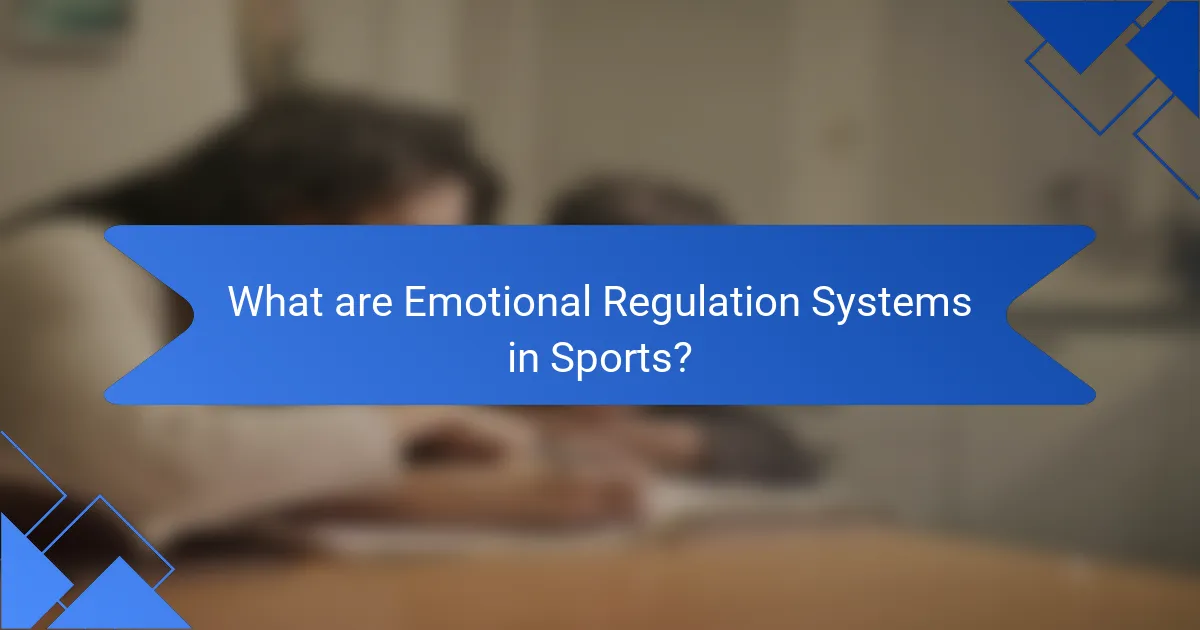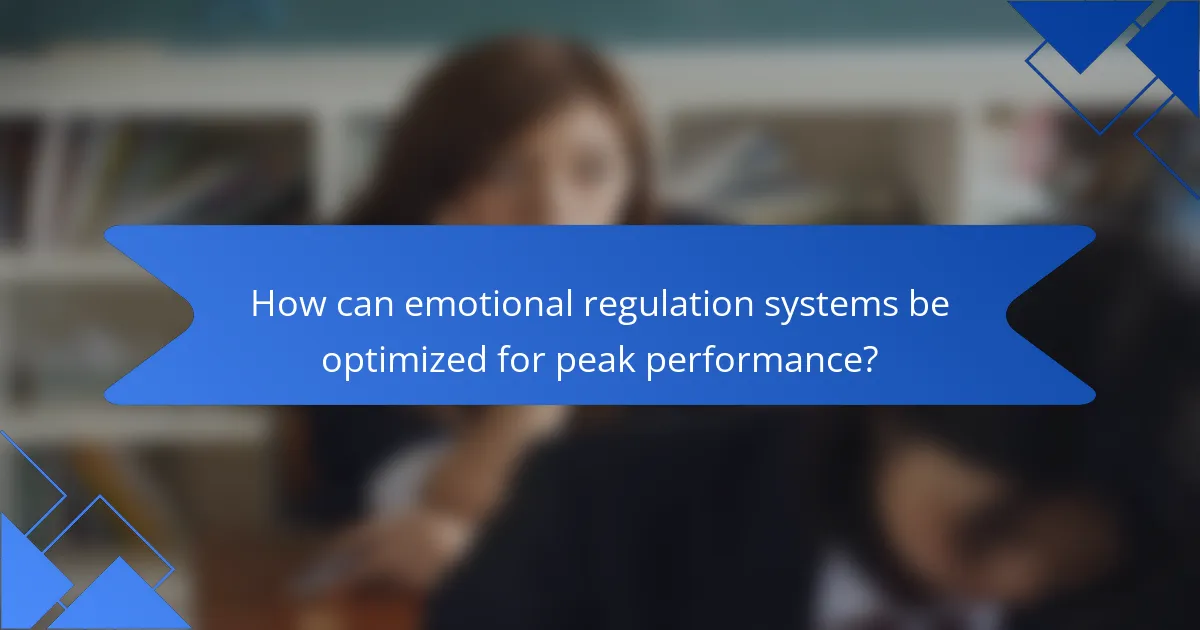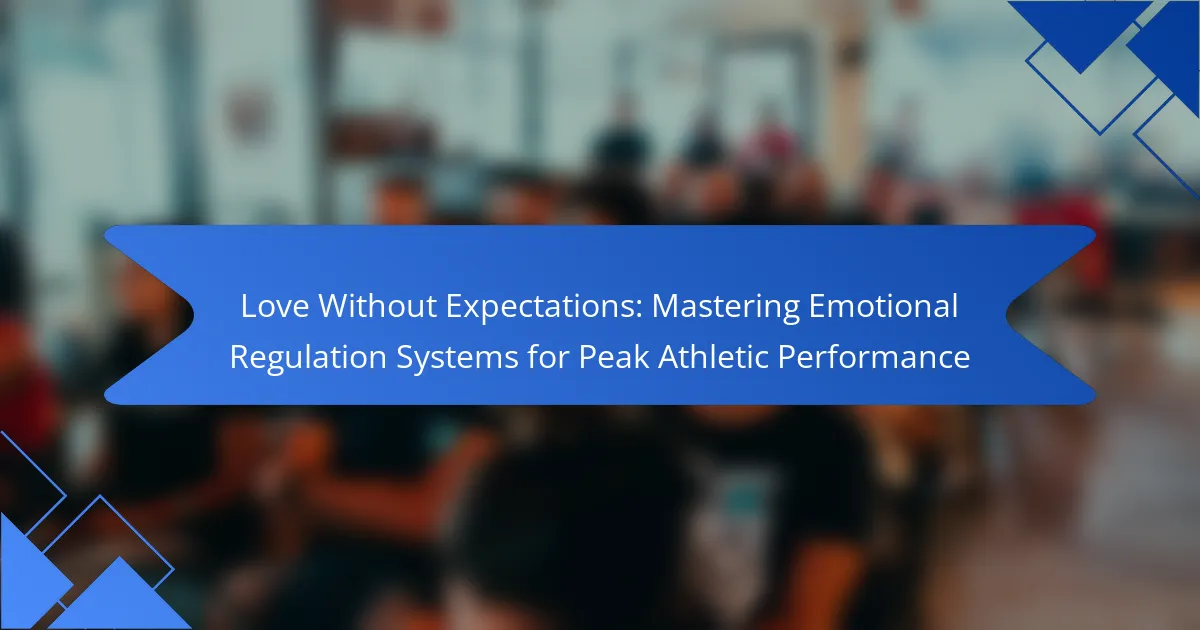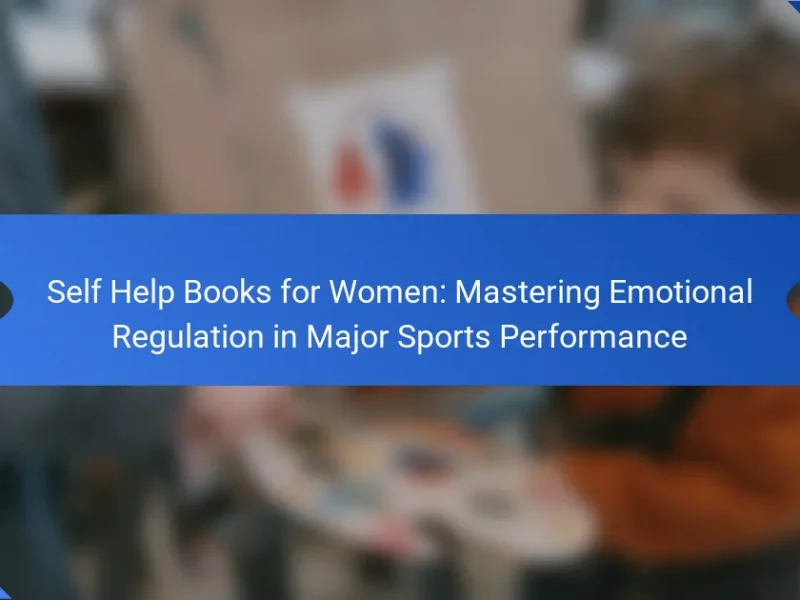Mastering emotional regulation systems can enhance athletic performance by improving focus, resilience, and decision-making. This article explores effective strategies like mindfulness and cognitive restructuring. It also highlights the importance of self-awareness and adaptability in managing emotions during competition. Additionally, we will discuss how these systems contribute to achieving peak performance metrics.

What are Emotional Regulation Systems in Sports?
Emotional regulation systems in sports are strategies athletes use to manage their emotions for optimal performance. These systems enhance focus, resilience, and decision-making under pressure. Techniques such as mindfulness, cognitive restructuring, and emotional awareness contribute to an athlete’s ability to maintain composure during competitions. Research indicates that effective emotional regulation can lead to improved performance metrics, such as increased scoring efficiency and reduced error rates. Mastery of these systems fosters a mindset that embraces challenges, ultimately supporting peak athletic achievement.
How do Emotional Regulation Systems impact athletic performance?
Emotional regulation systems significantly enhance athletic performance by enabling athletes to manage their emotions effectively. Mastery of these systems leads to improved focus, resilience, and decision-making during competition. Research indicates that athletes with strong emotional regulation skills experience less performance anxiety and greater overall satisfaction in their sport. This emotional stability allows for consistent training and optimal performance in high-pressure situations.
What are the key components of Emotional Regulation Systems?
Emotional Regulation Systems consist of awareness, control, and expression of emotions. These components enable athletes to manage their emotional responses effectively, enhancing performance. Awareness involves recognizing emotions in real-time. Control refers to the ability to modulate emotional responses. Expression is about conveying emotions appropriately. Mastering these components fosters resilience and focus during competition.
How do thoughts influence emotions in athletes?
Thoughts significantly influence emotions in athletes by shaping their mental states and performance outcomes. Positive self-talk can enhance confidence, while negative thoughts may lead to anxiety and decreased performance. Cognitive restructuring techniques can help athletes reframe their thoughts, promoting emotional resilience. Research indicates that emotional regulation through thought management is crucial for achieving peak performance in sports.
What role does self-awareness play in emotional regulation?
Self-awareness significantly enhances emotional regulation by enabling athletes to recognize and understand their emotions. This recognition allows for better control over emotional responses during competition. Increased self-awareness leads to improved focus, reduced anxiety, and enhanced performance. Athletes who master self-awareness can identify triggers and adjust their emotional states, fostering resilience and adaptability in high-pressure situations.

What are the universal attributes of effective emotional regulation in sports?
Effective emotional regulation in sports involves self-awareness, resilience, adaptability, and mindfulness. These universal attributes enhance athletes’ performance by managing emotions during competition. Self-awareness allows athletes to recognize their emotional states, while resilience helps them recover from setbacks. Adaptability enables quick responses to changing situations, and mindfulness fosters focus and presence. Together, these attributes create a robust emotional regulation system that supports peak athletic performance.
How does emotional regulation enhance focus during competition?
Emotional regulation enhances focus during competition by enabling athletes to manage stress and maintain composure. This control allows for clearer decision-making and sustained concentration, essential for peak performance. Studies indicate that athletes who practice emotional regulation techniques, such as mindfulness and cognitive reappraisal, show improved focus and reduced anxiety. As a result, they can execute strategies effectively and respond to competitive challenges with resilience. Mastering these emotional regulation systems contributes significantly to overall athletic success.
What strategies promote resilience in athletes?
Emotional regulation strategies enhance resilience in athletes by fostering adaptability and focus. Techniques such as mindfulness, visualization, and cognitive restructuring empower athletes to manage stress and maintain peak performance. Research indicates that athletes who practice these strategies exhibit improved emotional control and better coping mechanisms during competition. Regular training in these areas leads to increased confidence and reduced anxiety, ultimately supporting sustained athletic success.

What unique attributes set apart successful emotional regulation systems?
Successful emotional regulation systems are distinguished by their adaptability, self-awareness, and resilience. These unique attributes enable athletes to navigate emotional challenges effectively. Adaptability allows for real-time adjustments in response to stressors, enhancing performance. Self-awareness fosters an understanding of emotional triggers, promoting proactive management. Resilience equips athletes to recover from setbacks, maintaining focus on long-term goals. These attributes collectively create a robust framework for mastering emotional regulation, ultimately leading to peak athletic performance.
How do elite athletes utilize emotional regulation techniques differently?
Elite athletes utilize emotional regulation techniques by focusing on mindfulness, cognitive restructuring, and self-compassion. Mindfulness enhances present-moment awareness, allowing athletes to manage stress effectively. Cognitive restructuring helps them reframe negative thoughts, turning pressure into motivation. Self-compassion fosters resilience, enabling athletes to recover from setbacks. These techniques are tailored to individual needs, enhancing performance without emotional burden.
What innovative practices are emerging in sports psychology?
Innovative practices in sports psychology focus on emotional regulation systems to enhance athletic performance. Techniques such as mindfulness training, cognitive restructuring, and biofeedback are gaining traction. These methods promote emotional awareness and resilience, enabling athletes to manage stress and anxiety effectively. Research indicates that athletes who master these practices experience improved focus and performance consistency. Additionally, integrating technology, like wearable devices for real-time emotional monitoring, is becoming a unique attribute in the field, offering personalized insights for peak performance.

What rare attributes can significantly impact emotional regulation?
Rare attributes that can significantly impact emotional regulation in athletes include resilience, mindfulness, and self-compassion. Resilience enables athletes to bounce back from setbacks, enhancing their emotional stability. Mindfulness promotes awareness of emotions, allowing for better regulation during competitive stress. Self-compassion fosters a supportive internal dialogue, reducing negative emotional responses. These attributes collectively contribute to mastering emotional regulation systems, ultimately improving athletic performance.
How does emotional intelligence contribute to peak performance?
Emotional intelligence enhances peak performance by enabling athletes to manage stress and maintain focus. It fosters resilience, allowing athletes to recover from setbacks effectively. High emotional intelligence facilitates better teamwork and communication, crucial for collaborative sports environments. Additionally, it promotes self-awareness, helping athletes understand their emotional triggers and optimize their mental state for competition.
What uncommon techniques are used by top athletes to manage emotions?
Top athletes often use mindfulness, visualization, and breathing techniques to manage emotions effectively. These uncommon methods enhance focus and emotional stability during competition.
Mindfulness practices, such as meditation, allow athletes to stay present and reduce anxiety. Visualization helps them mentally rehearse performances, building confidence and emotional resilience. Controlled breathing techniques regulate physiological responses, ensuring optimal emotional states.
These strategies not only improve mental clarity but also foster a deeper connection to their performance, aligning emotional regulation with peak athletic output.

How can emotional regulation systems be optimized for peak performance?
To optimize emotional regulation systems for peak athletic performance, athletes should focus on mindfulness, cognitive restructuring, and emotional awareness. Mindfulness practices enhance focus and reduce anxiety, directly impacting performance. Cognitive restructuring helps athletes reframe negative thoughts, fostering a positive mindset. Emotional awareness allows athletes to identify and manage their feelings, preventing emotional disruptions during competition. Implementing these strategies can lead to improved resilience and consistency in performance.
What are the best practices for athletes to master emotional regulation?
Athletes can master emotional regulation by practicing mindfulness, developing self-awareness, and employing cognitive restructuring techniques. These methods enhance focus, reduce anxiety, and improve performance under pressure.
Mindfulness training helps athletes stay present, allowing them to manage stress effectively. Self-awareness enables them to recognize emotional triggers, fostering better responses in competitive situations. Cognitive restructuring aids in reframing negative thoughts, promoting a positive mindset.
Incorporating these practices into daily routines can lead to improved emotional control and peak athletic performance. Consistent application of these strategies is essential for long-term success.
What common mistakes do athletes make in emotional regulation?
Athletes often struggle with emotional regulation due to unrealistic expectations, lack of self-awareness, and poor coping strategies. These mistakes can hinder performance and lead to burnout. Unrealistic expectations can create pressure, causing anxiety and performance drops. A lack of self-awareness prevents athletes from recognizing their emotional triggers, leading to uncontrolled reactions. Poor coping strategies, such as avoidance or aggression, can exacerbate emotional challenges. Addressing these mistakes through mindfulness and emotional intelligence training can enhance performance and overall well-being.
How can coaches support athletes in developing emotional regulation skills?
Coaches can support athletes in developing emotional regulation skills by fostering a safe environment, teaching coping strategies, and encouraging self-reflection. This approach enhances athletes’ performance and overall well-being. Coaches should model emotional regulation themselves, demonstrating how to handle stress and setbacks. Regular feedback and open communication help athletes identify their emotional triggers and develop personalized strategies for managing them. Incorporating mindfulness practices can also improve athletes’ focus and emotional control during competitions.
What insights can be drawn from the latest research in sports psychology?
Recent research in sports psychology emphasizes the importance of emotional regulation for optimal athletic performance. Studies indicate that athletes who master emotional regulation systems experience enhanced focus, resilience, and motivation. These skills contribute to peak performance by allowing athletes to manage stress and maintain composure under pressure. Furthermore, integrating techniques such as mindfulness and cognitive restructuring can significantly improve emotional responses during competitions. This approach fosters a positive mindset, ultimately leading to better outcomes in sports.


